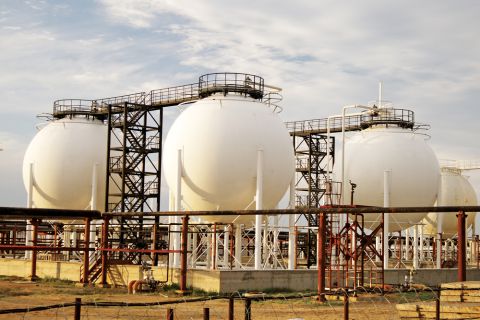
If through negotiations the U.S. returns to the Iran nuclear agreement, that will affect oil markets as more Iranian oil could flow, further oversupplying the market. (Source: Shutterstock.com)
Presented by:

[Editor's note: A version of this story appears in the January 2021 issue of Oil and Gas Investor magazine. Subscribe to the magazine here.]
Welcome to a new year, where we hope to see a big reboot of the U.S. economy as we gradually get the pandemic under control. Many uncertainties remain.
But by now, the energy industry knows what to expect with Joe Biden in the White House: the U.S. will rejoin the Paris Climate Accord, which is now five years old, and Biden will push for strengthening it. Environmental regulations that were killed or diluted in the past four years will be reinstated, if not strengthened. Pipeline permitting may take even longer with environmental analysis being a bigger part of the equation.
For More on President Biden’s First Days:
Oil and Gas World Perceives Biden’s Orders as a Threat
Biden Poised to Freeze Oil Lease Sales on Federal Lands, Waters
Biden Takes Sweeping Day One Action on Energy, Keystone XL
Oil and Gas Industry Stung by Biden’s Blow Against KXL
It’s important to remember that this country has already made more progress in reducing its CO2 emissions than any other nation has, and it was done in the marketplace (using more natural gas and less coal), not by government. As the API and IPAA have pointed out, the oil and gas industry played a big part in this, even if proponents of green energy don’t like to admit it.
But beyond whatever Biden plans to do directly about energy, there is another big factor that might affect the industry, and that’s his foreign policy actions. Once again, international affairs and energy will intersect. So said Jason Bordoff, writing in Foreign Policy.
Speaking for Columbia University’s Center for Global Energy Policy, he pointed out in a recent article that Biden’s foreign policies could have as much effect on oil prices as any other actions he might take.
Even if Republicans control the Senate and create roadblocks to his domestic agenda (which was not yet clear at this writing), Biden can use foreign policy as a tool to achieve some of his climate aims, Bordoff said. One of the areas where he has authority is in issuing executive actions. Giving former Senator and Secretary of State John Kerry a seat at the cabinet as a climate emissary is also strong proof of the high priority placed on environmental issues that cross borders.
“The policy shifts that result—in areas as diverse as international trade, development finance, [nuclear] nonproliferation and diplomacy—will do at least as much as his domestic agenda to shake up global energy markets,”Bordoff wrote.
Inserting heightened environmental and energy criteria into U.S. trade policies can expand clean energy efforts and create jobs here and abroad, and we can export the right technologies to countries like China and India that are struggling to contain rising emissions. Biden has also promised to impose border tariffs on carbon-intensive imports. The EU is already planning to do this, Bordoff added. If the U.S., in turn, can prove it has less carbon-intensive fuels to export, that’s a win for us.
No relationship is more important than that which we have with China. The U.S. and China dominate the global economy, and together they account for nearly half of global emissions. Both have pledged to one degree or another to cut emissions and move to using cleaner energy sources, and to achieve net-zero emissions in the next decades.
Bordoff said that as the Biden administration re-engages with the international community, it will have more influence with multilateral financial institutions, such as the World Bank and International Monetary Fund, to make climate change factors part of economic decision-making and lending.
If through negotiations the U.S. returns to the Iran nuclear agreement, that will affect oil markets as more Iranian oil could flow, further oversupplying the market just when economic recovery seems possible in second-half 2021.
Russia, now a partner in OPEC+, would be likely to get even closer to Saudi Arabia in light of all this, especially if Biden places further sanctions on Russia if the relationship further deteriorates.
“One of Biden’s most enduring legacies in global energy markets may be how diplomacy and geoeconomics tools in international finance, development assistance, trade and innovation will have brightened the outlook for clean energy and expanded opportunities for U.S. firms in the sector,” Bordoff concluded.
“Progress at home will enhance U.S. credibility abroad,” he said.
For progress at home, 42 corporations have sent Biden an open letter urging him and Congress to work together, and urgently, to enact what the letter called “ambitious, durable, bipartisan climate solutions.” The companies were from diverse sectors of the economy including consumer giants Amazon, Unilever and Walmart, and energy or chemical firms such as Dow, BP, Cargill, NRG and Shell.
Talk is cheap, but in the letter, these companies said they recognize that the climate issue is “a business imperative” and that managing it will create new jobs. Addressing climate challenges will enable them to attract employees, investors and customers, they said. That’s where the oil and gas industry will come in. By controlling methane emissions and developing economic ways to capture, store and recycle CO2, the industry can continue to deliver energy that’s needed while chasing down pollutants that are undesirable, thereby setting an example for the world for years to come.
Editor’s note: This story was originally published at 3 a.m. CT Jan. 29, 2021.
Recommended Reading
TPH: Lower 48 to Shed Rigs Through 3Q Before Gas Plays Rebound
2024-03-13 - TPH&Co. analysis shows the Permian Basin will lose rigs near term, but as activity in gassy plays ticks up later this year, the Permian may be headed towards muted activity into 2025.
For Sale, Again: Oily Northern Midland’s HighPeak Energy
2024-03-08 - The E&P is looking to hitch a ride on heated, renewed Permian Basin M&A.
E&P Highlights: Feb. 26, 2024
2024-02-26 - Here’s a roundup of the latest E&P headlines, including interest in some projects changing hands and new contract awards.
Gibson, SOGDC to Develop Oil, Gas Facilities at Industrial Park in Malaysia
2024-02-14 - Sabah Oil & Gas Development Corp. says its collaboration with Gibson Shipbrokers will unlock energy availability for domestic and international markets.
E&P Highlights: Feb. 16, 2024
2024-02-19 - From the mobile offshore production unit arriving at the Nong Yao Field offshore Thailand to approval for the Castorone vessel to resume operations, below is a compilation of the latest headlines in the E&P space.





